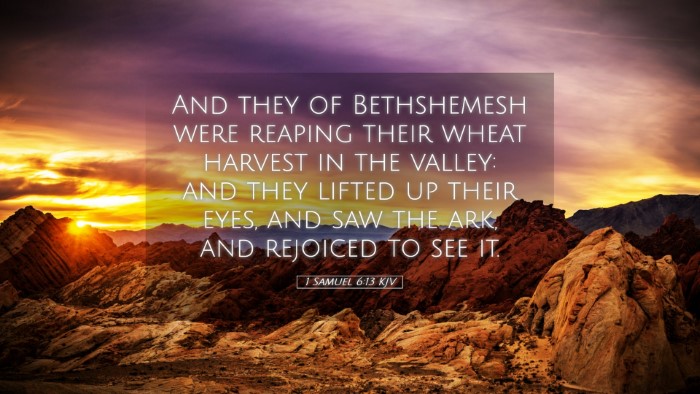Commentary on 1 Samuel 6:13
Verse: "And they of Bethshemesh were reaping their wheat harvest in the valley: and they lifted up their eyes and saw the ark, and rejoiced to see it."
Introduction
The narrative in 1 Samuel 6 presents a vital moment in the history of Israel, marked by the return of the Ark of the Covenant after its captivity by the Philistines. This verse encapsulates the joy and significance of that event. The people of Bethshemesh, engaged in the physical toil of harvesting, suddenly encounter the sacred presence of God’s Ark, which represents His covenant and divine favor.
Contextual Analysis
To appreciate the full depth of this verse, one must consider the historical and theological contexts. The Ark had been captured by the Philistines, a calamity that symbolized God’s disfavor towards Israel. Its return marks not only a restoration of God’s presence but also serves as a reminder of His covenant with Israel. The joy of the Bethshemites indicates a reclaiming of hope and divine favor.
Matthew Henry’s Insights
Matthew Henry emphasizes the contrast between the sacred and the secular. He notes that the harvest symbolizes the daily labor and concerns of life, yet, amidst these mundane tasks, the people behold the Ark. This juxtaposition highlights a divine interruption in human routines, reminding believers that God often reveals Himself in the midst of daily life. Henry also comments on the joy of the people, suggesting that true spiritual joy comes from recognizing God’s presence amidst everyday circumstances.
Albert Barnes’ Commentary
Albert Barnes highlights the reverence associated with the Ark’s return. He reflects on the significance of the location—Bethshemesh was a Levitical city, indicating a place of worship and proper reverence for the things of God. Barnes suggests that their rejoicing upon seeing the Ark reflects not only their relief but a deeper acknowledgment of their identity as God’s chosen people. He draws attention to the wheat harvest, indicating their material prosperity and divine blessings. Barnes encourages believers today to maintain a heart of gratitude and joy when recognizing God’s actions in their lives.
Adam Clarke’s Perspective
Adam Clarke provides a detailed analysis of the agricultural context. He notes that the wheat harvest was a significant period for agricultural societies, representing sustenance and survival. Clarke elucidates that the lifting of the eyes signifies an awakened sense of awareness to the divine. He connects this theme to the broader biblical narrative of God’s presence—often associated with blessings, guidance, and protection. Clarke posits that the harvest signifies not only physical sustenance but also spiritual nourishment found in the presence of God.
Theological Implications
The event described in 1 Samuel 6:13 raises profound theological reflections. The Ark's return is multifaceted, embodying themes of sin, redemption, and covenant. The people's joy reflects a restoration of right relationship with God, reminiscent of the New Testament promise of being reconciled through Christ. Theologians may explore how this return prefigures the ultimate return of God to His people, as seen through the workings of Christ in the New Covenant.
Understanding Divine Interventions
- God’s Sovereignty: The capture and return of the Ark highlight God’s ultimate authority over both Israel and her enemies.
- Revelation in Daily Life: This encounter serves as a reminder that divine moments can arise in the midst of ordinary experiences.
- Community Response: The collective joy emphasizes the importance of communal worship and recognition of God’s blessings.
Practical Applications
For pastors and teachers, this verse offers various avenues for practical application:
- Celebrating God’s Presence: Encourage congregations to recognize and celebrate God’s active presence in their lives.
- Cultivating Joy: Emphasize the importance of joy in the believer’s life, especially amidst labor and routine.
- Holistic Worship: Foster an understanding that every aspect of life, including work, can be infused with spiritual significance.
Conclusion
1 Samuel 6:13 serves as a reminder of God’s divine interruptions and the joy that accompanies His presence. By examining the perspectives of Matthew Henry, Albert Barnes, and Adam Clarke, one can appreciate the layered meanings within this brief but powerful verse. It challenges believers to lift their eyes from their immediate circumstances and recognize the overarching narrative of God’s redemptive work in their lives.


